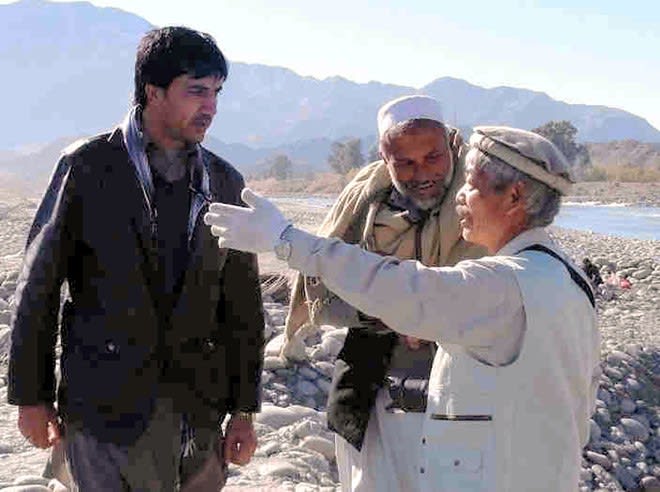Briefly, the life of Tetsu Nakamura (1946-2019)
I first heard about Tetsu Nakamura from a friend in 2018. He was a Japanese physician who moved to Pakistan (and later Afghanistan) in 1984 to help people during the Soviet-Afghan War. After several years of treating people mainly for leprosy and tuberculosis, he had expanded his activities to treat more illnesses, enlisted the help of foreign charities and funders, and opened three new clinics in Nangahar Province in the eastern parts of Afghanistan.
Not content with the rate at which he was helping people, he began thinking creatively about how he could do more good with his time by addressing underlying problems. He’d noticed that most of his cases came from the same regions, and he attributed many of the illnesses he was treating to the severe malnutrition and poverty of the area. So naturally he switched paths and started prioritising agriculture.
Soon after, a severe drought hit the region at the turn of the millennium, so he promptly set to work digging irrigation canals from the Kunar River so people had fertile land to grow crops on. Modern equipment was nowhere to be found, so he and his team researched 200-year old irrigation techniques to get the job done. He explained his reasoning:
“One irrigation canal will do more good than 100 doctors. A hospital treats patients one by one, but this helps an entire village. I love seeing a village that’s been brought back to life.”
This was extremely perilous work, to be clear. Local Talibani groups weren’t too happy with him. Maybe because they didn’t like competition for power or because he was Christian—although he was no missionary, and he’s pretty clear about just trying to help people. Either way, Nakamura had received several threats and warnings over the years, and one of his close colleagues was abducted and killed in 2008. At one point he narrowly escaped machinegun-fire from a U.S. helicopter.
I think it took a lot of courage to do what he did, but ultimately there is always a sacrifice. On December 4th, 2019, he, his driver, and four of his government-assigned bodyguards were shot and killed by unidentified gunmen. Taliban denies involvement, but whatever—he’s dead all the same. Wikipedia lists him as having built eight canals that now support the livelihood of 600,000 people, plausibly averting a famine. He had a theory of change and acted on it.
“Weapons and tanks don’t solve problems. The revival of farming is the cornerstone of Afghanistan’s recovery.”
There’s a beautifwl documentary on him made before he was shot, but resources in English are hard to find. Apparently there are books about or written by him, but they’re all in Japanese. If you know the language, let me know if you find translations! Or if you end up reading them, I’d love to hear more about it. This was hastily written, and I kinda hope someone with access to these resources will do a proper write-up sometime.

Thanks for sharing this! I’d never heard of this Tetsu Nakamura before. I’d love to hear more stories like this.
Thanks for sharing, inspiring indeed!
FWIW, my main concern with stories such as this is that they may motivate altruistic people to take greater than optimal risks. For example, the benefits of being physically present in a place (e.g. to better manage the construction of channels) may not outweight eventual risks.
Thanks so much for writing this post! I agree with everything Vaidehi said.
You really hyperlinked to the comment directly above your own? Smooth. :p
I too want more books like Strangers Drowning. I know of two books that try to do the same from a non-EA-perspective:
Heroes: From Alexander the Great & Julius Caesar to Churchill & de Gaulle
(Spoiler: Most of these can hardly be called “heroes” imo. Not recommed.)
The Triumph of Liberty: A 2000 Year History Told Through the Lives of Freedom’s Greatest Champions
IIRC it some cool stories with questionable accuracy of people with grit, and I liked it more than the previous book above, but I can’t really recommend it.
Additionally some inspiring biographies:
I know I really liked Frederick Douglass’ autobiography. He seems like he was a really good person iirc. Weakly recommend.
I wholeheartedly recommend The Infidel and the Professor: David Hume, Adam Smith, and the Friendship That Shaped Modern Thought, however! Maybe not prototypical heroes, but fighting to advance thought and make a nicer world in a somewhat hostile climate while maintaining their integrity.
If you or anyone reading this has recommendations of this sort, consider yourself nudged to comment.
Very inspiring, thanks!